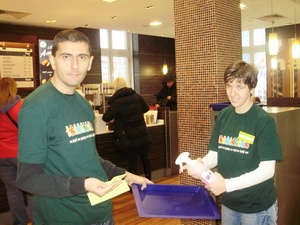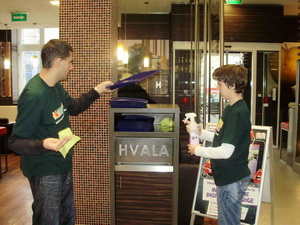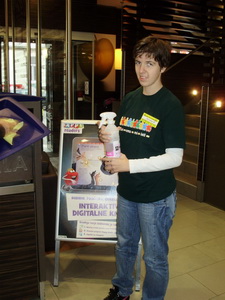 The Creative and Education Centre (KEC) has been implementing a program which enables employment for individuals with intellectual disability during which 140 adults fulfilling different work and therapy tasks in small and larger companies have shown that their social inclusion is possible.
The Creative and Education Centre (KEC) has been implementing a program which enables employment for individuals with intellectual disability during which 140 adults fulfilling different work and therapy tasks in small and larger companies have shown that their social inclusion is possible.
By end 2004, 12 KEC program users have been engaged as employees in two McDonald’s restaurants in Belgrade for the first time. One hundred and forty individuals with intellectual difficulties have been engaged within this NGO’s program until now and showed that they can be included in social activities to the satisfaction of three parties – their own, their families and their surroundings.
According to KEC Director Margareta Kecman, only 5% of program users have given up for health reasons in almost a decade.
– At the beginning, few companies were ready to join. They were sceptical and wondered how would the persons facing intellectual difficulties cope in a business environment, how would their colleagues react? Today, we have a list of companies waiting to join, Margareta Kecman does not hide her pride and adds that this programme is the program of inclusion in practice.
– The very inclusion of users and the sensation they have that they are useful – the sense of dignity – cannot be described, she continues.
Each employment adjusted to each user. They are active between one hour per day to six hours during all five working days. At the beginning, we had one assistant per two program users but, in time, we realized that we did not need them any more. Today, Ana Viještica is the only assistant for the entire organization.
KEC program users are engaged in various companies: McDonald’s restaurants, Parking servis parking service, Jewish Community, Delta Holding, Maxi supermarkets, Home Centre, Clinical Centre of Serbia, Rogenart bakeries, KPMG International, Ikon Print printing house, cultural institutions of the Belgrade Philharmonic Orchestra and the National Theatre, the residencies of the French Embassy, the embassy of Norway, Portugal, Indonesia, the EU Delegation etc.
The approval rate is 100%. However, there are normative limits. Namely, when we started, this kind of employment was not “covered” by the laws.
An individual facing intellectual difficulties is not legally entitled to sign any documents, contract. Instead of him/her, parents or foster parents sign the papers. In this way, they are deprived of their right to be recognized as individuals with work ability. They cannot get an employment, and the system treats them as beneficiaries of different kinds of social assistance services (custodial care and assistance). The law stipulates solely employment in work centres, former sheltered workshops.
 With the adoption of the Law on Professional Rehabilitation and Employment of Disabled Individuals (2009), lobbying and results based on previous experience of KEC programme, the amendment to the Article 43 of this Law, Paragraph 6, has been adopted, according to which employment can be conducted outside sheltered workshops but that this segment must be regulated by bylaws. Unfortunately, bylaws have not yet been adopted.
With the adoption of the Law on Professional Rehabilitation and Employment of Disabled Individuals (2009), lobbying and results based on previous experience of KEC programme, the amendment to the Article 43 of this Law, Paragraph 6, has been adopted, according to which employment can be conducted outside sheltered workshops but that this segment must be regulated by bylaws. Unfortunately, bylaws have not yet been adopted.
– The solution would be to recognize partial work ability to people suffering intellectual difficulties in order to enable them to be rewarded them for their work. Other countries in the region, such as Slovenia, Croatia, Austria etc. are also facing the same issue… Here, in our country, this solution should include the amendments to the Family Law, the Law on Social Care and the Labour Law, Margareta Kecman explains.
Israel is a good example. People suffering from intellectual disabilities receive assistance there but they can sign employment contracts as well.
KEC’s programme has so far gained the support of the Labour and Social Policy Ministry, the Fund for Social Innovations, Erste Foundation and the EU Delegation.
– In Serbia, these individuals are “covered” by the system and children are included in the education system. When they exit the education system, once they become adults, they simply do not belong to any environment. The society treats them as if they were in ghetto. That is why their engagement is the road to self-confidence, the feeling they belong somewhere and recognition of the environment when it comes to this part of the population, our interlocutor says.
Aleksandar Krstić is a 34-year-old man, he lives in Belgrade settlement Bežanijska kosa and he works in a McDonald’s restaurant at Slavija Square every day for an hour.
– I am very happy when I am here. I am cleaning trays and tables with some of my friends here. I, for example, take a tray and Nena puts “liquid” and then we clean and distribute, this young man describes his work here.
Nena is 23-year-old Nevena Hajzer’s nickname who also comes to work at McDonald’s with a smile on her face.
 Anita Erdevički, a hostess in this facility, says that program users are very positive individuals, and that they are happy to be there. Some come accompanied by their parents who wait for an hour for their “big-small” child to finish.
Anita Erdevički, a hostess in this facility, says that program users are very positive individuals, and that they are happy to be there. Some come accompanied by their parents who wait for an hour for their “big-small” child to finish.
Many of them take off their uniforms after an hour with tears in their eyes and they can hardly wait to return here.
Visitors grew accustomed to their presence. They often praise their work.
According to McDonald’s Marketing Coordinator Marina Trnavčanin, the company has been engaged in the inclusion of disabled individuals for eight years now.
– Individuals with intellectual disabilities are participants with equal rights in work process in our restaurants. We are trying to encourage other social participants to support this process with our example and provide space to the individuals with intellectual difficulties they deserve, she adds.
– The cooperation with KEC dates back since 2005. Ever since then, 40 young people from this Centre, in several restaurants, are taking care of service quality together with employees. Our experience is very positive. We are hoping to set an example for other companies and start employing individuals with disabilities, she hopes. And she only has compliments for Aca and Nena’s friends and colleagues.
– They are both good employees and good colleagues. They are very responsible and approach every task seriously. They are always here on time and they are trying to do as much as they can and they are ready to help in every situation. We are very grateful for this. We are happy to have them in our family.
 Government of the Republic of Serbia
Government of the Republic of Serbia















 pdf [271 KB]
pdf [271 KB]
Leave a Comment